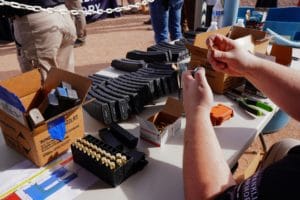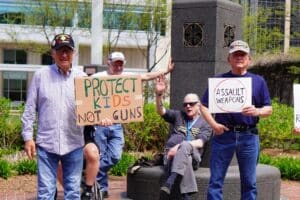The rate of “red flag” petitions and approvals is far lower in Colorado counties that have declared themselves “Second Amendment Sanctuaries” than in the rest of the state.
Those are the findings of a new study released Monday in JAMA Network Open from a team of researchers with the University of Colorado School of Medicine Firearm Injury Prevention Initiative. It examined civil court documents for each instance Colorado’s Extreme Risk Protection Order (ERPO) law was used from January 1, 2020, to December 31, 2022. It found that across the state, ERPO petitions were less likely to be filed, less likely to be initiated by law enforcement, and less likely to be approved by a judge in self-declared sanctuary counties than in non-sanctuary counties.
“In this cross-sectional analysis of all 338 ERPO petitions filed in Colorado from 2020 to 2022, 37.3 percent were filed in 2A sanctuaries, with 31.7 percent of these petitions were made by law enforcement,” the study’s authors wrote. “When compared with ERPO petitions filed in non-2A sanctuary counties, those from sanctuaries were less likely to have been petitioned for by law enforcement and less likely to be granted.”
The study’s findings offer a mixed bag for proponents and opponents of emergency gun confiscation policies alike. They suggest that local resistance to the policy, spearheaded by concerns over gun rights and due process, does have some practical impact on its use. At the same time, the findings confirm that such resistance is not absolute and that even localities in declared opposition to the law have found occasion to take advantage of it.
ERPO statutes, also called “red flag” laws, allow police officers to confiscate firearms from a person deemed by a judge to be a credible threat to themselves or others. While such laws have existed in some states for decades, their prominence exploded in 2018 following the Marjory Stoneman Douglas shooting in Parkland, Florida. In a successful push from gun-control advocates that began shortly after that attack, the number of states with “red flag” laws grew from two to 21, plus the District of Columbia. Colorado adopted its law in 2019, and it took effect beginning in 2020.
The spread of ERPO laws quickly became controversial with gun-rights advocates and some civil libertarians. Common critiques include charges that they infringe on the right to keep and bear arms without a criminal conviction or even a civil proceeding with sufficient due process. That’s because most iterations currently allow a judge to issue a confiscation order without the accused party being able to defend themselves or even be present in court in some cases.
The growth of these critiques coincided with a burgeoning Second Amendment sanctuary movement sweeping conservative-leaning counties and municipalities in opposition to state and federal gun-control efforts. The two movements met in earnest in Colorado with the passage of the ERPO law in 2019. That year, 37 of the state’s 64 counties declared themselves Second Amendment sanctuaries.
Over the three years analyzed by the researchers, 126 ERPOs were initiated in the self-declared Second Amendment sanctuaries. Law enforcement officials initiated the petition in just 40 instances, and a judge approved an emergency order authorizing temporary gun confiscation in 61 cases–roughly 48 percent of the time.
By contrast, 227 petitions were initiated in all other counties and were filed by law enforcement 138 times, a rate of roughly 65 percent. These petitions were also approved by a judge 78 percent of the time.
The researchers acknowledged that political opposition to ERPOs was likely behind the lower rate of petitions in sanctuary counties but called the rate of law enforcement filing “notably low” even compared to other states that have seen similar resistance movements.
“Possibilities include that 2A sanctuary declarations give law enforcement officers a false impression that filing for ERPOs is not legally possible in their jurisdictions, agency policies that discourage filing in light of declarations, and compensatory petitioning among other eligible petitioners (eg, family members who file under the impression that law enforcement are not able or willing to do so),” they wrote.
They also hypothesized that concerned officers in Second Amendment sanctuaries may be relying on more thorough civil protection order laws for risky individuals rather than controversial ERPOs.
“Several cases were identified in which temporary orders were granted, but year-long ERPOs were not pursued in favor of other civil protection orders, which can be more restrictive than ERPOs by prohibiting all forms of contact, last at least 2 years, and can become permanent in certain circumstances,” they wrote. “It may be possible that similar courses of action are pursued in non-2A sanctuary jurisdictions, but it may also be possible that more general restraining orders are preferred in areas where ERPOs are more politically controversial.”
Still, the researchers highlighted the dozens of instances where ERPOs were used in sanctuary counties. They suggested that was evidence of the law’s positive impacts on violence prevention despite their politically charged reputation.
“Serious mental illness, substance misuse, and prior interactions with law enforcement featured prominently in 2A sanctuary petitions,” the authors wrote. “These case circumstances highlight dangerous situations in which ERPOs are an acceptable risk-prevention tool, even in areas politically predisposed to opposing them.”
The authors acknowledged that the study was limited by the recency of Colorado’s law change. They said further study is needed because the number of petitions and jurisdictions in which they have been filed is increasing over time. They said that’s partly because Colorado expanded the list of approved ERPO petitioners in 2023 to include medical professionals, district attorneys, and teachers.






